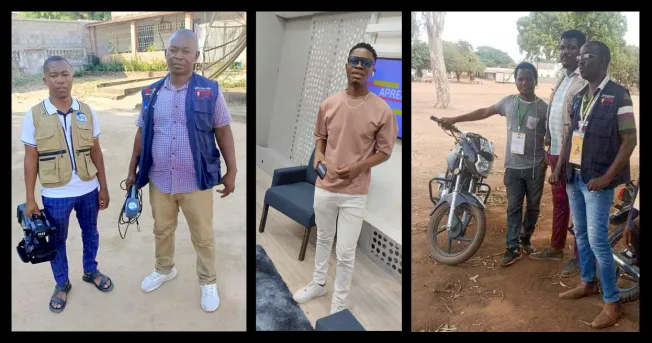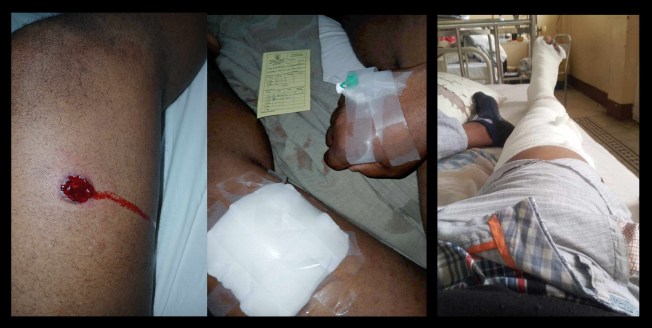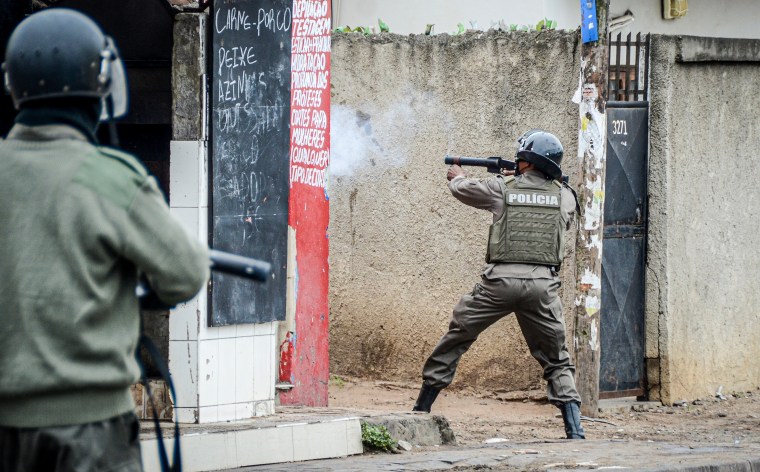New York, November 19, 2024—In the weeks since Mozambique’s October 9 general election — which was characterized by irregularities and in which the ruling Frelimo party claimed victory — the country has descended into chaos as security personnel engage in violent clashes with protestors disputing the results.
News reports and statements by human rights groups show that journalists covering the post-election crackdown have not been spared from the violence, which has left at least 45 dead.
Authorities have assaulted or arrested at least nine journalists and expelled at least two foreign correspondents. The government has imposed several Internet disruptions, further hindering news gathering and reporting.
Journalism has become “too risky and often impossible,” Gervásio Nhampulo, a journalist in northern Niassa province, told CPJ. “We have families to consider if something happens to us.”

Since the elections, CPJ documented the following press freedom violations:
Journalists detained
- Police arrested Bongani Siziba and Sbonelo Mkhasibe, South African journalists with the Nigerian media outlet News Central, and Charles Mangwiro, a local reporter with the state-owned Radio Moçambique, on November 14 in the capital, Maputo. The journalists said officers took them to a police station before armed, masked men transferred them to a second location that Siziba told CPJ “looked like barracks.” Siziba and Mkhasibe told CPJ they were held blindfolded, questioned several times, and accused of being spies who wanted to portray Mozambique in a grim light. They were released the following day.
Mkhasibe told CPJ the men refused to give him his blood pressure and diabetes medication while detained.
Journalists shot at, attacked
- About five plainclothes security agents chased and shot at Cesar Rafael and Valdimiro Amisse, reporters of Catholic Church-owned Radio TV Encontro, after the journalists refused to delete footage of a demonstration in northern Nampula province on November 13. Amisse told CPJ they initially escaped but later ran into the same officers who beat them with sticks, threw rocks at them, and tried to take their camera until members of the public intervened.
- Police fired a rubber bullet at Paulo Julião, head of the Mozambican office of the Portuguese news agency Lusa, hitting him on the back on November 4 in Maputo.
- Police officers assaulted and briefly detained Nuno Alberto, a reporter with the community Radio Monte Gilé, while he was covering protests on October 25 in Gilé, a town in the central Zambézia province. Alberto told CPJ that an officer grabbed him by the throat and threw him to the ground, and others kicked him, slapped him, and beat him with batons. The officers took him to a police station, where they beat him again and forced the journalist to wear a mask and hold a protest placard as officers took pictures of him. He was released after two hours without charge.
- Police fired tear gas at several journalists covering opposition protests in Maputo on October 21. TV Gloria camera operator Bruno Marrengula told CPJ that he was hospitalized for two days with a broken tibia after a police officer hit him with a tear gas canister.
- Police fired tear gas at a group of journalists covering a press conference by opposition leader Venâncio Mondlane in a separate incident later on October 21. Gaspar Chirinda, a reporter with the private news network STV, said a tear gas canister was fired near his legs, hitting and injuring him.

Expelled from the country
- Immigration officers confiscated the passports of Alfredo Leite and Marc Silva, Portuguese reporters with TV networks CMTV and NOW TV, on November 1 on allegations of working in Mozambique on tourist visas. Leite told CPJ they were expelled from Mozambique on November 3.
Equipment confiscated
- Intelligence agents confiscated the phones of Nhampulo and Jaime Joaquim, local journalists with the privately owned TV Amaramba, and Nunes Rafael, a reporter with Radio Esperança, a station owned by the religious group Church Assembly God Alfa and Omega, while they were reporting on protests in Niassa on October 26. The journalists told CPJ their devices were returned after two hours.
In an October 22 press conference, spokesperson of the Mozambican Council of Ministers Filimão Swaze said police did not target journalists, and they were attacked while covering protests on October 21 because they were “in a place where there were also protestors.”
CPJ did not receive responses to calls and messages to Maputo police spokesperson Leonel Muchina, Mozambique police general commandant Bernardino Rafael, and Swaze.
In recent years, Mozambican authorities have harassed, beaten, and charged several journalists. Authorities have yet to credibly account for the 2020 disappearance of radio journalist Ibraimo Mbaruco.
